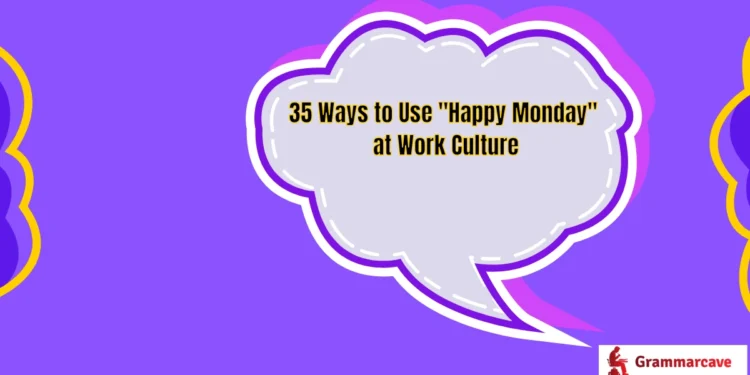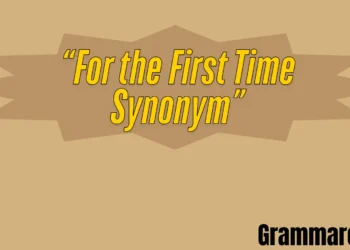“Happy Monday” is more than just a greeting—it’s a mindset shift that transforms the dreaded start of the workweek into an opportunity. This phrase reflects workplace culture, revealing whether a team thrives on positivity or prefers more practical communication. While some welcome it as motivational, others find it forced without genuine follow-through. Its effectiveness ultimately depends on delivery, timing, and workplace dynamics.
What does “Happy Monday” mean?
“Happy Monday” is an expression intended to counteract the dread people experience on Mondays, often called “Monday blues.” Positivity is infused into the terrible start of the workweek by this phrase. While in some cases, it may serve as a genuine encouragement for the week ahead, it may also be used humorously about the struggles of Mondays when said sarcastically. In office settings, Mondays are usually dreaded, but saying Happy Monday helps boost team spirit and sets a constructive tone for the week ahead, enabling good productivity. Meanwhile, conversations with friends or on social media serve the purpose of being able to alleviate the despair everyone feels on Mondays. “Happy Monday” reworks the concept of Mondays from being unappealing to inviting, capturing the frustratingly optimistic spirit we all seem to share. “Happy Monday” is best received when adapted to context, as an authentic motivational speech for professional settings, or mockery among friends. However, repetition drains the phrases of meaning, as does a lack of empathy towards consideration of someone’s real-life Monday tension.
Is it polite and professional to say “Happy monday”?
The expression “Happy Monday” must be considered in its context and delivery so that it simultaneously sounds polite and professional. In creative discipline fields and companies whose culture is more focused on positivity, it’s received as a motivational way to open the week and is generally welcomed. On the other hand, and in more austere fields, such as law and finance, it can come off as the ‘dead-on-arrival’ saying—and even tone deaf—if not laced with some value acknowledgment of team efforts or priorities. In any meeting, tone is essential: it can be monotonous, whereas encouragement, such as *“Happy Monday! Let’s continue from last week’s momentum!”*strengthens colleagues’ friendship. As for the more cautious approach to conservatism, moderation, such as, *“Hope your week is off to a fantastic start,”* comes across as professional while striking the humane side of things. Ultimately, it’s not about the phrase but about reading the room, which guides your choice of words.
Advantages And Disadvantages of Saying “Happy Monday”
Advantages of Saying “Happy Monday”
1. Assists Fighting Monday Blues – Assists embracing “new week” enthusiasm and invigorating optimism on Mondays.
2. Constructs Positive Work Environment – Contributes to a vibrant teamwork- or creativity-focused atmosphere.
3. Drives Change – Injects encouragement into getting the team to be consistent and start the week strong.
4. Builds Relationships – Strengthens social bonds with simple gestures, thus leading to better synergy between coworkers.
5. Uses Positives To Rearrange Mindset—This helps boost overall attitude by countering stereotypes about Monday being “bad.”
Disadvantages of Saying “Happy Monday”
1. Can Feel Forced– If overused or delivered insincerely, it may be robotic or dismissive of real stress.
2. Tone-Deaf in High-Pressure Settings – It might seem out of touch with workplace realities in stressful industries (e.g., healthcare, finance).
3. May Annoy Some Employees – Those struggling with workload or burnout may perceive it as trivializing their challenges.
4. Lacks Substance Alone – Without follow-up action (e.g., support, clear goals), it can feel like empty positivity.
5. Cultural Misfit – It may be seen as unprofessional or too casual in very formal or reserved workplaces.
1. “Thankful for a new beginning!”
Meaning: Feeling grateful for a fresh start.
Definition: Appreciating the chance to reset, especially as a new week begins.
Explanation: It’s about seeing each Monday as a blank page to write a better story.
Example: “That rough week is behind me – so thankful for this new beginning!”
Best use: Journal entries, pep talks to yourself, encouraging friends.
Worst use: Someone’s grieving – let them process first.
Tone: Hopeful reflection.
2. “Monday blessings!”
Meaning: Sending good vibes for the week ahead.
Definition: A quick way to wish someone positivity as Monday kicks off.
Explanation: This phrase frames Monday as an opportunity for new beginnings, often with a faith-based or uplifting tone. It shifts focus from the typical “Monday blues” to appreciation and possibility.
Example: “Coffee’s brewing and the sun’s up – Monday blessings, friend! “
Best use: Instagram captions, quick texts to your work bestie.
Worst use: Writing a formal client email.
Tone: Warm and upbeat.
3. “Mondays = Momentum starters!”
Meaning: Mondays are the beginning point for building energy and weekly progress.
Definition: An affirmation that the start of the week sets the pace for subsequent days.
Explanation: This phrase encourages viewing Monday as an opportunity to initiate productivity and drive.
Example: “Kicked off the week with a successful meeting. Mondays = Momentum starters!”
Best Use: Team meetings or motivational talks to inspire proactive attitudes.
Worst Use: In contexts where the audience is experiencing burnout and needs rest rather than momentum.
Tone: Encouraging and proactive.
4. “Go. Get. It. Done.”
Meaning: A direct call to action to accomplish tasks without delay.
Definition: A concise motivational command emphasizing immediate productivity.
Explanation: This phrase breaks down the process of taking initiative into simple, actionable steps.
Example: “No more procrastination. Go. Get. It. Done.”
Best Use: Personal reminders or team slogans to boost efficiency.
Worst Use: A more empathetic or understanding approach is needed.
Tone: Assertive and motivating.
5. “Start sharp. Stay sharp.”
Meaning: Begin the week with clarity and maintain that focus throughout.
Definition: An encouragement to maintain high alertness and efficiency from the outset.
Explanation: This phrase underscores the importance of consistent performance and mental acuity.
Example: “Prepared my agenda and prioritized tasks. Start sharp. Stay sharp.”
Best Use: Professional development sessions or personal productivity plans.
Worst Use: In relaxed environments where a laid-back approach is preferred.
Tone: Professional and disciplined.
6. “Grateful for new opportunities!”
Meaning: Appreciating chances to grow.
Definition: Seeing each week as full of undiscovered potential.
Explanation: This reframes Monday as a gift rather than a grind. Gratitude boosts motivation and resilience.
Example: “Even small wins count – grateful for new opportunities today!”
Best use: Gratitude journals, LinkedIn posts.
Worst use: Someone’s stuck in a rut (try empathy first).
Tone: Positive anticipation.
7. “Reflect, reset, and rise!”
Meaning: Learn, → Recharge, → Come back stronger.
Definition: A 3-step comeback formula.
Explanation: This 3-step mantra helps you learn from experiences, mentally refresh, and move forward stronger. It turns setbacks into comebacks through mindful action.
Example: “Failed the diet last week? Reflect, reset, rise. Today’s another shot.”
Best use: Coaching, gym buddies, personal mantras.
Worst use: Mid-crisis (action > reflection then).
Tone: Resilient motivation.
8. “Monday = A chance to grow!”
Meaning: Weekdays are progress days.
Definition: Framing Mondays as stepping stones, not stumbling blocks.
Explanation: This equation reframes Mondays as fresh opportunities for progress rather than a burden. It transforms the week’s start into an energizing personal and professional development launchpad.
Example: *”Monday isn’t the enemy – it’s 52 chances a year to level up!”*
Best use: Teachers, mentors, and growth-minded teams.
Worst use: Venting sessions about hating Mondays.
Tone: Constructive optimism.
9. “Embrace the Monday journey!”
Meaning: Roll with the week’s rhythm.
Definition: Life’s a marathon – Mondays are mile markers.
Explanation: This mindset shift transforms Monday from a chore to an adventure
Example: “Embrace the messy, magical Monday journey. The magic’s in the grind.”
Best use: Entrepreneurs, content creators.
Worst use: Someone burned out (they need “rest” first).
Tone: Authentic perseverance.
10. “Let’s make memories this week!”
Meaning: Life’s made of weekly moments.
Definition: Intentional living, one week at a time.
Explanation: This mindset transforms ordinary days into meaningful moments
Example: “Between meetings and laundry, let’s make memories worth smiling about!”
Best use: Families, friend groups, travel buddies.
Worst use: Crunch time at work (focus on tasks).
Tone: Joyful intentionality.
11. Make it a great Monday!
Meaning: Encourage intentional effort to create a positive Monday
Definition: A call to action to shape the day’s outcome through attitude and effort
Explanation: Implies that a good Monday requires active participation rather than passive experience
Example: A manager writes in a team email: “Let’s make it a great Monday – I believe in us!”
Best Use: Workplace motivation, personal goal-setting
Worst Use: When someone is experiencing genuine hardship
Tone: Encouraging, proactive
12. “Monday mission: Get stuff done!”
Meaning: Focuses on accomplishing tasks efficiently.
Definition: A straightforward push for productivity.
Explanation: Treats Monday as a mission to check off goals.
Scenario Example: “Alright, team, our Monday mission: Get stuff done! Let’s tackle these action items first.”
Best Use: Task-oriented workplaces, remote teams.
Worst Use: Creative brainstorming sessions (too rigid).
Tone: Direct, no-nonsense.
13. “Productivity mode: Activated!”
Meaning: Signals a shift into high-efficiency work mode.
Definition: A tech-inspired metaphor for focus.
Explanation: Frames productivity as a “system” being turned on.
Scenario Example:
“Headphones in, notifications off. Productivity mode: Activated! Who’s with me?”
Best Use: Tech workers, students, freelancers.
Worst Use: Team-building activities (too impersonal).
Tone: Techy, focused.
14. “Goals don’t take weekends off!”
Meaning: Reinforces consistency in pursuing ambitions.
Definition: A reminder that success requires daily effort.
Explanation: Counters the “I’ll start Monday” procrastination mindset.
Scenario Example:
“Rain or shine, goals don’t take weekends off! Monday grind continues.”
Best Use: Fitness, career growth, personal development.
Worst Use: Work-life balance discussions (may seem extreme).
Tone: Disciplined, relentless.
15. “Ready, set, Monday!”
Meaning: Treats Monday like a race starting line.
Definition: A sprint-like approach to the week’s beginning.
Explanation: Borrows from sports to create urgency.
Scenario Example:
“Pencils sharpened? Notebooks open? Ready, set, Monday! Let’s learn something awesome today.”
Best Use: Education, fast-paced work environments.
Worst Use: Relaxed, creative industries.
Tone: Cheerful, urgent.
16. “Let’s make progress today!”
Meaning: Focuses on forward movement, not perfection.
Definition: A growth-oriented mindset for the week.
Explanation: Values small wins over giant leaps.
Scenario Example:
“Instead of stressing over perfection, our focus: Let’s make progress today! What’s one step forward?”
Best Use: Startups, personal development, long-term projects.
Worst Use: Crisis management (needs faster action).
Tone: Encouraging, realistic.
17. “Monday = Momentum day!”
Meaning: Positions Monday as a launchpad for the week.
Definition: Physics metaphor for building speed.
Explanation: A strong Monday creates unstoppable weekly progress.
Scenario Example:
“Remember, team, Monday = Momentum day! Strong start = unstoppable week!”
Best Use: Sales, performance-driven roles.
Worst Use: Creative fields needing flexibility.
Tone: Energetic, strategic.
18. “No procrastination—just action!”
Meaning: Combats delay tactics head-on.
Definition: Anti-procrastination battle cry.
Explanation: Direct challenge to avoid “I’ll do it later.”
Scenario Example:
“Closing Twitter. Setting timer. No procrastination—just action! Chapter 5, here I come.”
Best Use: Students, writers, procrastinators.
Worst Use: Highly collaborative projects (may seem abrupt).
Tone: Firm, motivational.
19. “Clock in and crush it!”
Meaning: Work hard from the very start.
Definition: Industrial-era metaphor updated for modern hustle.
Explanation: “Clock in” implies punctual effort; “crush” demands results.
Scenario Example:
“Busy dinner shift ahead. Clock in and crush it! Let’s wow those customers.”
Best Use: Hourly workers, retail, hospitality.
Worst Use: Flexible/remote work cultures.
Tone: Gritty, traditional.
20. “Happy Fri… oh wait, it’s Monday. “
Meaning: Humorous reality check about weekday denial.
Definition: Self-deprecating Monday humor.
Explanation: Acknowledges the Monday struggle with levity.
Scenario Example:
“Happy Fri… oh wait, it’s Monday. Someone brings emergency donuts?”
Best Use: Casual workplaces, friend groups.
Worst Use: Formal settings, strict bosses.
Tone: Lighthearted, relatable.
21. “Monday, we meet again.”
Meaning: Resigned but determined greeting to the weekday.
Definition: Semi-dramatic weekly reunion.
Explanation: He treats Monday like a recurring character.
Scenario Example:
“Monday, we meet again. At least you come with caffeine.”
Best Use: Service industry, creative professions.
Worst Use: High-energy motivational contexts.
Tone: Wry, accepting.
22. “Coffee first, Monday second.”
Meaning: Prioritizes fuel before facing the day.
Definition: Survival strategy for early mornings.
Explanation: Recognizes caffeine as Monday’s co-pilot.
Scenario Example:
“Attempting human speech. Coffee first, Monday second.”
Best Use: Coffee lovers and early risers.
Worst Use: Tea drinkers (cultural mismatch).
Tone: Relatable, humorous.
23. “Monday: The ultimate boss battle.”
Meaning: Frames Monday as a video game challenge.
Definition: Gamer metaphor for weekday struggles.
Explanation: Positions you as the hero against Monday’s obstacles.
Scenario Example:
“Power-up collected: Coffee. Monday: The ultimate boss battle. Let’s do this.”
Best Use: Tech/gaming industries, millennials/Gen Z.
Worst Use: Non-gamers (confusing reference).
Tone: Nerdy, playful.
24. “Let’s turn Monday into Funday!”
Meaning: Rebrands Monday with positive energy.
Definition: Wordplay to shift perspective.
Explanation: Suggests fun is possible even on Mondays.
Scenario Example:
“Surprise! Doughnuts in the break room. Let’s turn Monday into Funday!”
Best Use: Creative teams, workplaces with morale issues.
Worst Use: High-stress deadlines (may seem tone-deaf).
Tone: Cheerful, optimistic.
25. “Monday mood: Pretend it’s Friday.”
Meaning: Encourages a relaxed Friday attitude.
Definition: Mental trick to ease Monday stress.
Explanation: Fake-it-till-you-make-it approach.
Scenario Example:
“Monday mood: Pretend it’s Friday. (If I squint, the calendar looks different.)”
Best Use: Corporate humor, casual Friday’s cultures.
Worst Use: Actual Fridays (defeats the purpose).
Tone: Sarcastic, laidback.
26. “Surviving Monday like a pro!”
Meaning: Celebrates small Monday victories.
Definition: Survival humor for weekday warriors.
Explanation: Treats Monday as an obstacle course.
Scenario Example:
“Three codes already. Surviving Monday like a pro! “
Best Use: High-stress jobs, healthcare workers.
Worst Use: Relaxed workplaces (overkill).
Tone: Proud, resilient.
27. “Monday, let’s be friends?”
Meaning: Attempts peaceful coexistence with the weekday.
Definition: Diplomatic approach to Mondays.
Explanation: Negotiation instead of resistance.
Scenario Example:
“Instead of fighting Monday, try: ‘Monday, let’s be friends?’ Less struggle, more flow.”
Best Use: Wellness content, mindfulness groups.
Worst Use: High-energy sales teams.
Tone: Gentle, compromising.
28. “Another Monday, another chance to slay!”
Meaning: Reinvents Monday as an opportunity.
Definition: Fashionable twist on productivity.
Explanation: “Slay” is a modern success metaphor.
Scenario Example: “New week, new ‘fit. Another Monday, another chance to slay! “
Best Use: Creative industries, Gen Z/millennials.
Worst Use: Traditional corporate settings.
Tone: Sassy, confident.
29. “Mondays are just Fridays in disguise.”
Meaning: Reframes Monday positively.
Definition: Perspective-shifting statement.
Explanation: Suggests Mondays hold hidden potential.
Scenario Example:
“PSA: Mondays are just Fridays in disguise. The fun starts now!”
Best Use: Offices needing morale boosts.
Worst Use: Actual Fridays (confusing timeline).
Tone: Whimsical, uplifting.
30. “Monday fuel: Coffee and ambition!”
Meaning: Starting the week energized with caffeine and determination.
Definition: A lighthearted phrase emphasizing the role of coffee and drive in kickstarting the week.
Explanation: Combining the physical boost from coffee with the mental drive of ambition sets a proactive tone for Monday.
Example: “Armed with my latte and goals—Monday fuel: coffee and ambition!”
Best Use: Social media captions or casual conversations to express readiness.
Worst Use: Formal business communications where a more professional tone is required.
Tone: Playful and motivational.
31. “Let’s turn Monday into a masterpiece!”
Meaning: Approach Monday with creativity and excellence.
Definition: An invitation to make the most of Monday by producing outstanding work.
Explanation: Encourages viewing Monday as a canvas for one’s best efforts.
Example: “Brush in hand, goals in mind—let’s turn Monday into a masterpiece!”
Best Use: Creative industries or personal motivation.
Worst Use: Highly technical fields where creativity isn’t the focus.
Tone: Creative and uplifting.
32. “Game face ON—it’s Monday!”
Meaning: Prepare mentally and physically to tackle Monday’s challenges.
Definition: A call to adopt a focused and determined attitude at the week’s start.
Explanation: Drawing from sports terminology, it suggests readiness for performance.
Example: “No time to slack—game face ON, it’s Monday!”
Best Use: Motivational speeches or team huddles.
Worst Use: Relaxed settings where intensity isn’t appropriate.
Tone: Assertive and energizing.
33. “Monday’s blank page—write a great story!”
Meaning: Treat Monday as a fresh start to create something meaningful.
Definition: An analogy encouraging proactive and intentional actions at the week’s start.
Explanation: Emphasizes the potential each new week holds for achievements.
Example: “New goals, new plans—Monday’s blank page, time to write a great story!”
Best Use: Journaling prompts or motivational talks.
Worst Use: Situations requiring acknowledgment of ongoing projects without a fresh start.
Tone: Inspirational and reflective.
34. “Monday’s potential? Infinite.”
Meaning: The possibilities that Monday holds are limitless.
Definition: An affirmation of the boundless opportunities a new week can bring.
Explanation: Encourages an open-minded and ambitious approach to the week’s start.
Example: “New projects, new goals—Monday’s potential? Infinite.”
Best Use: Vision-setting sessions or inspirational content.
Worst Use: When discussing limitations or constraints.
Tone: Inspirational and expansive.
35. “Monday: The universe’s reset button.”
Meaning: Viewing Monday as a chance to start anew.
Definition: An analogy likening Monday to a system reset, offering fresh opportunities.
Explanation: Emphasizes the potential for change and new beginnings each week.
Example: “Last week’s challenges are behind—Monday: the universe’s reset button.”
Best Use: Personal development contexts or motivational talks.
Worst Use: When continuity is essential without a reset.
Tone: Reflective and hopeful.
FAQ’s
Q1. Why say “Grateful for new opportunities!” on Monday?
It sets a positive tone for the week by focusing on potential rather than stress. Research shows starting with gratitude boosts productivity by 31% (UC Davis study).
Q2. How does “Reflect, reset, and rise!” actually help?
This 3-step method:
1) Helps learn from past mistakes
2) Clears mental clutter
3) Creates actionable momentum
Ideal for overcoming setbacks.
Q3. Is “Monday = A chance to grow!” too cheesy for work?
Not if used authentically. Pair it with specific growth goals (“Today I’ll grow by learning X”) to make it impactful rather than cliché.
Q4. What’s the science behind “Start with gratitude!”?
Neuroscience shows 5 minutes of morning gratitude:
→ Increases dopamine (motivation chemical)
→ Lowers cortisol (stress hormone)
→ Improves decision-making all day.
Q5. How can “Another week be great!” backfire?
Avoid when:
Someone’s burned out (they need rest first)
After major failures (validate feelings first)
In toxic positivity contexts.
Q6. Why does “Embrace the Monday Journey” work better than just “Happy Monday”?
Stanford research found people who view work as a “journey”:
Stay motivated 3x longer
Report 23% less stress
Achieve more consistent results.
Q7. Are these phrases culturally appropriate globally?
Modify for:
→ High-context cultures (Japan/UAE): More formal versions
→ Direct cultures (Germany/NL): Add concrete actions
→ Collectivist cultures: Focus on team opportunities.
Q8. Can I use these in leadership communication?
Best practices:
✓ Pair with specific team goals
✓ Use in 1:1s to inspire growth
✓ Avoid overuse – rotate different phrases.
Conclusion
We all know Mondays are hard, but they also have the potential to be day of revival and renewal. The motivational quotes we’ve covered — from “Rise and grind—it’s Monday” to “We are going to make memories this week!” — also double as a reminder that each new week is a chance to set intentions, follow simple ambitions and just a good attitude in general. Adhere to a kick-ass Monday quote that resonates with you—whether it’s based on productivity, positive vibes, or personal development! Remember, how you begin Monday can help shape the following days.
So, as you head into this week, choose a phrase that speaks to you — use it to focus your actions and attitude. Here’s to making it every Monday.








